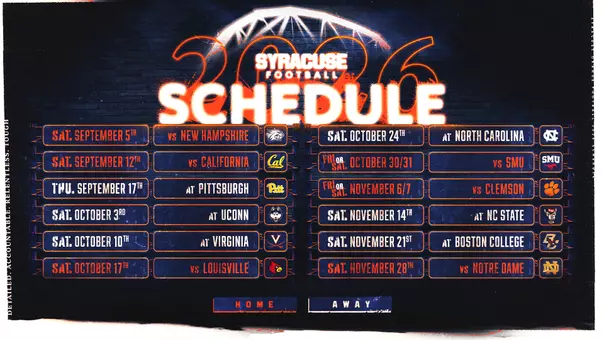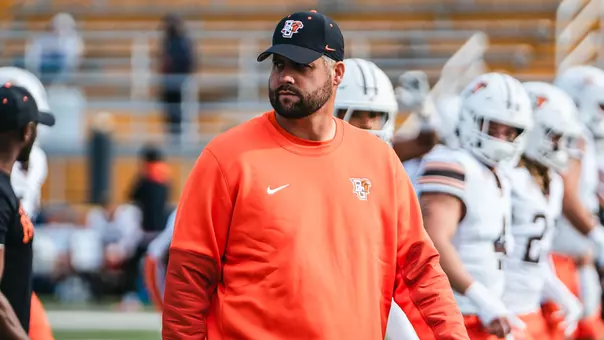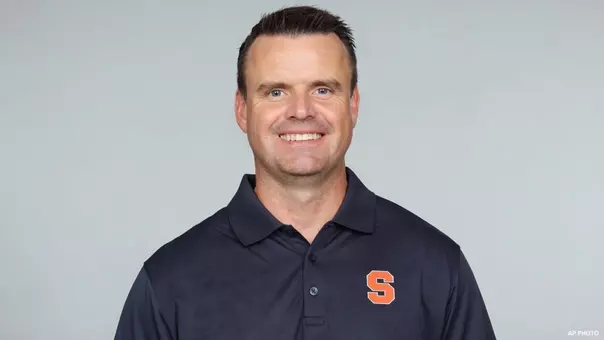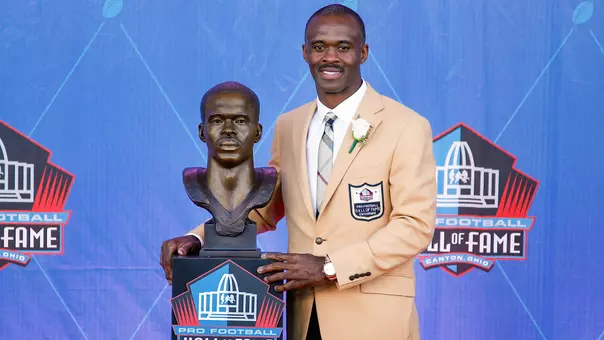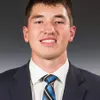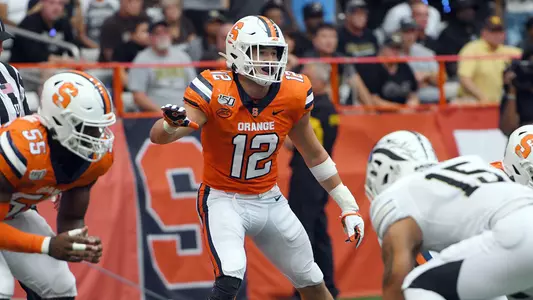
Photo by: Charles Wainwright
No Limits: Andrew Armstrong Doesn't Let Diabetes Slow Him Down
9/24/2019 11:24:00 AM | Football
Editor's note: This story appears in the Sept. 28 edition of the 2019 Syracuse football gameday program. Programs are available for $5 and sold throughout the Dome.
When Andrew Armstrong was diagnosed with diabetes, he had no idea what it was, or the impact it would have on his playing career. His very first question to the doctor was: "Am I still able to play sports?"
Five years since that day, the senior linebacker has proven that yes, he can play sports. And play them well, at that.
In the middle of basketball season as a 17-year-old junior at Ohio's Cardinal Mooney High School, Armstrong hadn't been feeling well. When he went to the doctor, his blood sugar was 250 mg/dL, well above the normal 80 to 120 mg/dL range. A week later, he was rushed to the hospital with a blood glucose level of 450 mg/dL and diagnosed with Type 1 diabetes, formerly called juvenile diabetes. It was a huge relief, he said, to hear from the doctor that if he managed it correctly and took care of his body, he could still play sports.
With his diabetes under control the following fall, Armstrong felt significantly better and had a lot more energy. With that, he had an outstanding football season. Armstrong was voted to Ohio's AP Division IV All-State First Team after racking up 83 tackles, two sacks, five interceptions and five pass breakups. Armstrong began receiving scholarship offers, including one from Syracuse, who had just hired head coach Dino Babers. All in all, the diagnosis didn't really phase him too much.
"I was happy that it wasn't cancer or a life-threatening disease," Armstrong said. "Diabetes can be, but with the proper care you can control it. I was just glad I was still able to play sports and do what I love."
Fluctuations in blood sugar levels are the biggest challenge for Armstrong. His normal blood glucose level is from 80-120 mg/dL. If he goes below that, he feels sick. Above, he feels hyper and can't concentrate. Avoiding temptations with food, and being sure to eat before classes, are key. He and the Syracuse medical staff constantly monitor his levels to make sure they're in the proper range.
Armstrong has a great support system in his family, friends, and his Syracuse football teammates, coaches, and staff. Without them, he wouldn't be able to do what he does, he said.

"Diabetes makes you unique. It makes you special. It makes you different from everyone else," Armstrong said. "Just because you have it doesn't mean you can't do what you love to do and follow your dreams. With the proper care of it and the proper support, you can do anything."
Among his supporters are Syracuse head athletic trainer for football Tim Pike and defensive coordinator/linebackers coach Brian Ward. Pike and Ward understand more than most what Armstrong deals with on a daily basis. Pike is a Type 1 diabetic himself and Ward's daughter, Ellie, is one as well.
A core special teams player and reserve linebacker during his first three seasons, Armstrong is now a senior with 41 games played under his belt. He is the most experienced member of Syracuse's linebacking corps. The starter on the weak side, he's tried to lead by example and be a more vocal presence for the defense.
"I had to follow before I could lead," Armstrong said.
He's had great mentors in that arena during his career. Players like Zaire Franklin, Kielan Whitner and Eric Dungey. He learned from them what it means to be the consummate teammate. When younger players have questions or need a ride, Armstrong is the first to offer his help.
Armstrong tries to be an example in the classroom and the community, too. That dedication was recognized over the summer when he was named to the watch list for the 2019 Wuerffel Trophy, an award presented to the college football player who best combines exemplary community service with athletic and academic achievement. A selected studies major in Syracuse University's School of Education, Armstrong actively supports the Central New York chapter of the Juvenile Diabetes Research Foundation (JDRF). He's a frequent speaker at JDRF events, sharing his story with other diabetics, and has participated in the organization's annual "One Walk" to raise money for diabetes research.
On the field, Armstrong is constantly communicating to help players be in the right position to make plays. He's as good a run stopper as he is in pass coverage.
As a junior last year, Armstrong tied for third in the ACC with two fumble recoveries. He recorded 45 tackles (22 solo), and in four games so far in 2019, he's tied for third on the team with 19 tackles (11 solo). He also has two pass breakups.
Every year in the United States, about 40,000 people are diagnosed with Type 1 diabetes and Armstrong is a perfect example that the diagnosis doesn't have to be a limitation.
"Honestly, I think God gave it to me for a reason," Armstrong said. "I can show young people that even though you have this disease you can still do what you love and accomplish your dreams."
For complete coverage of Syracuse football, follow us on Twitter (@CuseFootball), Instagram (@CuseFootball) and like us on Facebook (Syracuse Football).
When Andrew Armstrong was diagnosed with diabetes, he had no idea what it was, or the impact it would have on his playing career. His very first question to the doctor was: "Am I still able to play sports?"
Five years since that day, the senior linebacker has proven that yes, he can play sports. And play them well, at that.
In the middle of basketball season as a 17-year-old junior at Ohio's Cardinal Mooney High School, Armstrong hadn't been feeling well. When he went to the doctor, his blood sugar was 250 mg/dL, well above the normal 80 to 120 mg/dL range. A week later, he was rushed to the hospital with a blood glucose level of 450 mg/dL and diagnosed with Type 1 diabetes, formerly called juvenile diabetes. It was a huge relief, he said, to hear from the doctor that if he managed it correctly and took care of his body, he could still play sports.
With his diabetes under control the following fall, Armstrong felt significantly better and had a lot more energy. With that, he had an outstanding football season. Armstrong was voted to Ohio's AP Division IV All-State First Team after racking up 83 tackles, two sacks, five interceptions and five pass breakups. Armstrong began receiving scholarship offers, including one from Syracuse, who had just hired head coach Dino Babers. All in all, the diagnosis didn't really phase him too much.
"I was happy that it wasn't cancer or a life-threatening disease," Armstrong said. "Diabetes can be, but with the proper care you can control it. I was just glad I was still able to play sports and do what I love."
Fluctuations in blood sugar levels are the biggest challenge for Armstrong. His normal blood glucose level is from 80-120 mg/dL. If he goes below that, he feels sick. Above, he feels hyper and can't concentrate. Avoiding temptations with food, and being sure to eat before classes, are key. He and the Syracuse medical staff constantly monitor his levels to make sure they're in the proper range.
Armstrong has a great support system in his family, friends, and his Syracuse football teammates, coaches, and staff. Without them, he wouldn't be able to do what he does, he said.

"Diabetes makes you unique. It makes you special. It makes you different from everyone else," Armstrong said. "Just because you have it doesn't mean you can't do what you love to do and follow your dreams. With the proper care of it and the proper support, you can do anything."
Among his supporters are Syracuse head athletic trainer for football Tim Pike and defensive coordinator/linebackers coach Brian Ward. Pike and Ward understand more than most what Armstrong deals with on a daily basis. Pike is a Type 1 diabetic himself and Ward's daughter, Ellie, is one as well.
A core special teams player and reserve linebacker during his first three seasons, Armstrong is now a senior with 41 games played under his belt. He is the most experienced member of Syracuse's linebacking corps. The starter on the weak side, he's tried to lead by example and be a more vocal presence for the defense.
"I had to follow before I could lead," Armstrong said.
He's had great mentors in that arena during his career. Players like Zaire Franklin, Kielan Whitner and Eric Dungey. He learned from them what it means to be the consummate teammate. When younger players have questions or need a ride, Armstrong is the first to offer his help.
Armstrong tries to be an example in the classroom and the community, too. That dedication was recognized over the summer when he was named to the watch list for the 2019 Wuerffel Trophy, an award presented to the college football player who best combines exemplary community service with athletic and academic achievement. A selected studies major in Syracuse University's School of Education, Armstrong actively supports the Central New York chapter of the Juvenile Diabetes Research Foundation (JDRF). He's a frequent speaker at JDRF events, sharing his story with other diabetics, and has participated in the organization's annual "One Walk" to raise money for diabetes research.
On the field, Armstrong is constantly communicating to help players be in the right position to make plays. He's as good a run stopper as he is in pass coverage.
As a junior last year, Armstrong tied for third in the ACC with two fumble recoveries. He recorded 45 tackles (22 solo), and in four games so far in 2019, he's tied for third on the team with 19 tackles (11 solo). He also has two pass breakups.
Every year in the United States, about 40,000 people are diagnosed with Type 1 diabetes and Armstrong is a perfect example that the diagnosis doesn't have to be a limitation.
"Honestly, I think God gave it to me for a reason," Armstrong said. "I can show young people that even though you have this disease you can still do what you love and accomplish your dreams."
For complete coverage of Syracuse football, follow us on Twitter (@CuseFootball), Instagram (@CuseFootball) and like us on Facebook (Syracuse Football).
Players Mentioned
Calvin Russell Interview
Tuesday, January 13
Fran Brown Signing Day Press Conference
Wednesday, December 03
Syracuse Football - Signing Day Press Conference
Wednesday, December 03
Syracuse Football Postgame Press Conference
Saturday, November 29











